
When you’re a writer, there’s something to be said for the idea that nothing is wasted, especially when it comes to your writing career. Some screenwriting gurus will tell you that you aren’t doing it right unless you are churning out pages every day without a care as to whether they’ll actually turn into anything usable. That the joy and struggle of the art should be their own reward long before we dare to seek any material reward for our labors of love. As someone who comes from a town where scrapple is a treasured delicacy, the idea of throwing anything away makes me a little itchy.
In screenwriting, every lesson learned is a lesson earned, and there are plenty of opportunities for us to make some sort of return on our investment of time and intellectual labor– even if that means putting our chips back on the table and rolling the dice again instead of cashing in immediately. Here are some ways I’ve been able to flip a “small potatoes” opportunity into something bigger.

One-Act Play to Celebrated TV Pilot Script
As a high school playwright in Philadelphia, I sometimes found that my writing tastes were somewhat outside the budget and taste confines of the dramatic writing contest in which I frequently placed. My senior year entry for the competition was a political Fantasy called The Glass Empire (in the vein of Game of Thrones), which might have been one the most expensive productions the program had ever seen if produced to fit my vision. Instead of leaving this idea in the dust because something told me it was important, I would make another attempt to see it brought to life in college during a reader showcase that held even more “blackbox theater” sensibilities than the high school competition. But I knew that the writing was solid.
Years later, I turned this one-act play into an hour-long TV teleplay which garnered a Finalist placement in the Stage 32 contest. It impressed both of my former managers and attracted attachment interest from two actors who starred in one of my favorite Fantasy series of all time. This pilot was also name-checked in my placement on the 2018 Young & Hungry List. Flexibility in reinterpretation is a theme that has helped me level up more than once, and its importance cannot be stressed enough.
Read More: How to Make Your Story Theme Excite a Pro Script Reader
Short Documentary to Feature Length Documentary
Right out of college, I was approached by a collaborator of mine about helping out on his senior project—a twenty-minute documentary called The Last Laugh which expounded upon the importance of the Black sitcom and the history of their rise, fall, and resurgence. This collaborator knew that he needed a screenwriter to synthesize the interviews, research the topic and ask the kinds of questions that illuminated the subject in a way that felt like a compelling narrative. At that point, I had no idea that documentaries even required writers. But I rose to the challenge. My colleagues and I got to work in different parts of the country. They conducted the interviews in Los Angeles while I wrote and consulted from the East Coast. This short piece would include commentary from some of the most recognizable Black performers of the last several generations.
As of 2022, I am now in the early stages of collaboration on a documentary about metaphysical phenomena that will include the work of experts from around the world. The process I came up with on The Last Laugh for treating a topic like a protagonist to inspire an emotional connection with informational material is already being applied in the planning phases of this long-form work. Having the space to try something for the first time, which artists are rarely granted outside of small/unpaid projects, ushered in an opportunity to develop a proprietary method that translates into (hopefully) commercially viable projects.

Self-Funded Web Pilot to Hour-Long Pilot Written For-Hire
The same collaborator from The Last Laugh came to me a couple of years later, looking to convert an idea he’d been carrying around for a decent sum of his life into a show. Though the material was heavily biographical, it took a writer’s touch to figure out the tone and narrative world of the show. It also took a writer’s touch to guarantee that it would be funny. This series concept started as a spec web series that we co-created together. After a handful of the team chipped in the budget to film a fifteen-minute web pilot that turned out great, we were thusly given the opportunity to aim for a half-hour series that had a chance of getting picked up.
I rose to the challenge as the head writer on the team to whip out a double-page-count version of this pilot script that could be used to sell the half-hour show. Meetings were had with production companies on both coasts. Eventually, the pitching had to come to a halt for personal reasons. But this opportunity did lead to one for which I would be paid.
Not long after, I was approached by a director/producer who had some fresh Emmy nominations under his belt. He needed a writer at a very specific intersection of identities to help him flesh out an hour-long Sci-Fi pilot with a social impact heartbeat. I showed him samples, including the web pilot, and he hired me to turn his idea sketches into a full pilot. This would go on to become my first paid TV writing gig. And while this pilot didn’t get picked up yet either, you better believe it was worth it. Sometimes, the projects you invest your own money into will lead to paid work. That’s just a gamble best taken with shorter, less expensive material.
Summary
Truthfully, there’s no way to tell which projects will pay off in the long run unless a writer commits to holding onto the ones they hope will be worth it. Short-form projects are more than just “practice”—they are an opportunity to stretch your wings and see how far you can go with limited support and resources. If taken seriously enough, that will almost certainly lead to something bigger.

